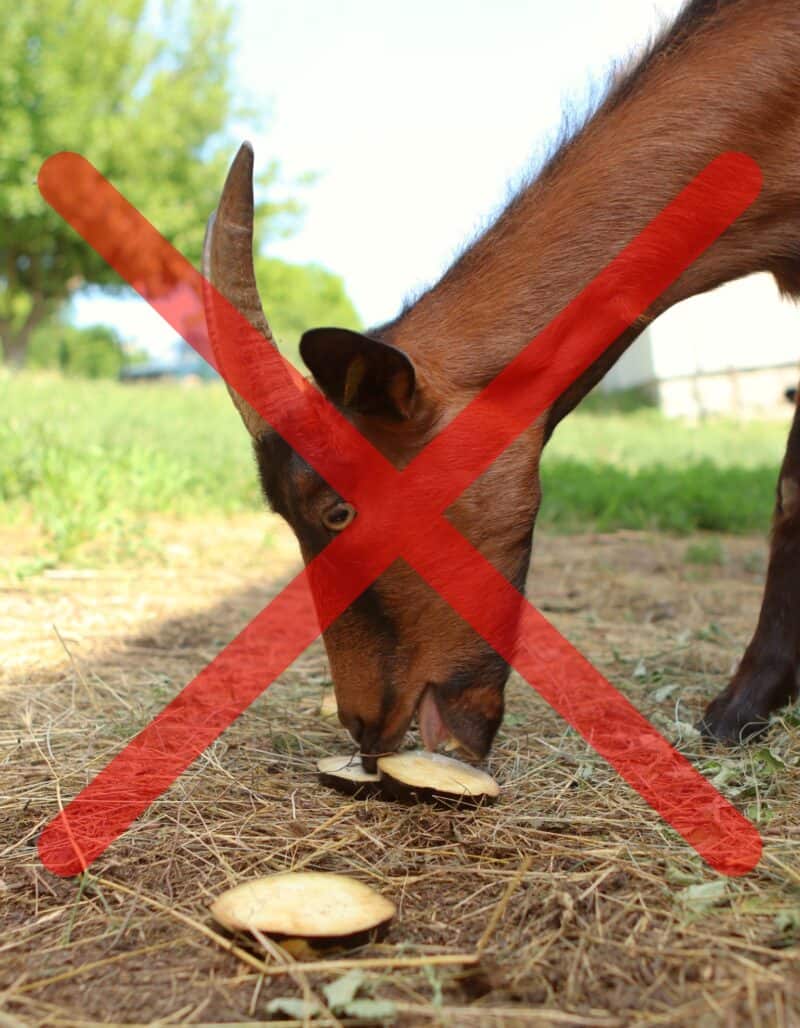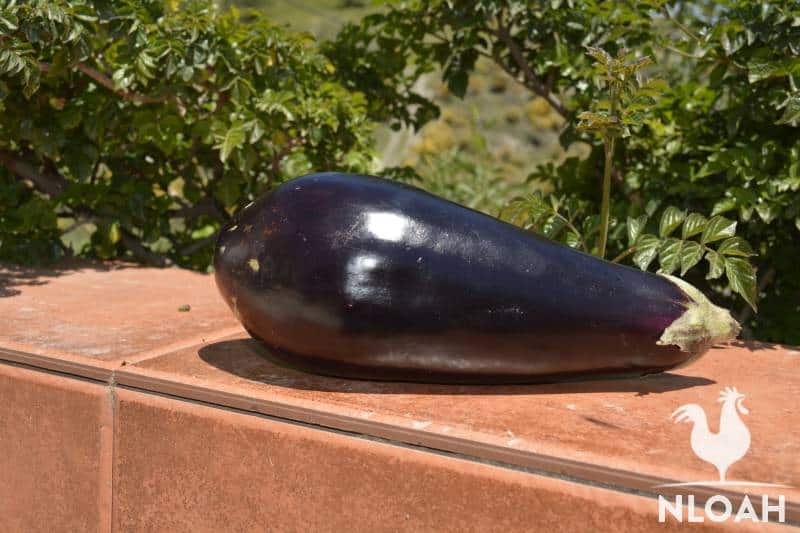Goats are herbivores, but they eat way more than just grasses and hay. They will eat leaves, twigs, fruits, vegetables and more.

Vegetables in particular make up a smaller but important part of a goat’s diet, often providing them with vitamins and minerals that their usual feed cannot.
Goats can enjoy many of the same vegetables that you and I do, too. How about eggplant? Can goats eat eggplant?
No, goats should not eat eggplant. Eggplant is a member of the nightshade family, and goats have shown sensitivity to eggplants. Various parts of the eggplant contain solanine, a toxic glycoalkaloid that can seriously harm goats, including inflicting neurological damage. Though the flesh of an eggplant usually only contains trace amounts of solanine, it is generally not worth the risk feeding them to goats.
Scary stuff. Although people and other animals can eat the flesh of eggplants, goats really should not.
Why they show such a marked sensitivity, typically, to this large vegetable is currently unknown. But whatever the case, you don’t want to risk harming your goats.
Keep reading to learn everything you need to know about eggplant in this regard.
Eggplants are Members of the Nightshade Family
Eggplants, along with potatoes, tomatoes and other flowering plants, are all members of the nightshade family.
Whether they are annual or perennial, vines, bushes or trees, all have one thing in common: they usually contain potent, toxic alkaloids and one in particular. Solanine.
Solanine may occur in any and usually all parts of a plant in the nightshade family, specifically the roots, stems, leaves, flowers and even the fruit.
In the case of eggplant, which is botanically classified as a berry, so only occurs in low concentrations in the skin and flesh, low enough where it isn’t harmful to consume. Usually…
And though goats can eat all sorts of plants that might be considered only mildly toxic and safe when consumed in small amounts, you are advised to avoid feeding them eggplant.
Solanine Can Kill Goats
Solanine, though usually only fatal when ingested in large amounts, can still make your goats gravely ill, or even kill them.
Curiously, goats seem particularly sensitive to solanine that has been ingested by consuming eggplant.
Worse yet, symptoms of solanine poisoning may be mistaken for other ailments and left untreated until it is too late.
Typical symptoms of solanine poisoning include diarrhea, vomiting, a lowered or erratic pulse, lethargy and collapse.
If you notice any of these symptoms in your goats you should investigate quickly and see if they have eaten or had access to any plants in the nightshade family, and eggplants in particular.
Although eating eggplant may or may not have negative effects for goats, the risk will persist, and if your goats eat eggplant and show any of the above symptoms you should consider it a medical emergency.

Can Goats Eat Eggplant Raw?
No, goats should not eat raw eggplant. The skin, flesh and calyx of the fruit all contain solanine and in quantities that might be enough to cause harm to goats.
Can Goats Eat Eggplant Cooked?
No. goats should not eat cooked eggplant, and you should know that cooking does nothing to neutralize or significantly reduce the amount of solanine in eggplant.
Can Goats Eat Solanine Stems and Leaves?
Never. Though the eggplant itself contains solanine, it is often the stems, leaves and roots that contain the highest concentrations.
As you likely already know, goats are pretty enthusiastic eaters and can easily chew and swallow tough matter like bark and roots.
The solanine has a profoundly bitter taste that should deter goats from eating it, they might persist if they are hungry enough.
A goat that eats the stems or roots of an eggplant vine will be facing serious health problems.
Caution: Baby Goats are Especially Vulnerable to Solanine
I hope that all readers would have deduced this by now, but baby goats should never, ever have eggplant or be allowed to eat any other part of the plant.
Because of their greatly reduced body mass and it still developing systems, kids are highly vulnerable to all sorts of poisoning, including poisoning by solanine.
Even a small dose could be enough to induce vomiting or diarrhea, which can easily lead to dehydration or electrolyte shock, dooming the poor little thing.
Never, ever allow baby goats to eat eggplant or be around the plants themselves.
What Should You Do if Your Goats Eat Eggplant?
If your goats eat eggplant, don’t panic. Definitely do, though, assess the situation. As mentioned above, if your goats show any symptoms call your veterinarian immediately and follow their advice.
But, if your goats seem normal and are behaving as expected just keep an eye on them, but make sure you completely eliminate the risk posed by eggplant or any other parts of the plant in the area.
If your goats seem to be poisoned by solanine, your vet will likely recommend you bring them in immediately as an emergency.
A timely medical intervention can reduce the impact of the poison, or even prevent long-term harm. The veterinarian might administer an antidote, or perhaps even pump the goat’s stomach.
In any case, close observation and supporting care will probably be prescribed for a couple of days at least.
Unfortunately, solanine poisoning does not usually run its course and then leave the sufferer no worse for the wear.
Significant organ damage can occur, and most alarmingly neurological damage is likely to affect the goat for the rest of their life.
Tom has lived and worked on farms and homesteads from the Carolinas to Kentucky and beyond. He is passionate about helping people prepare for tough times by embracing lifestyles of self-sufficiency.
